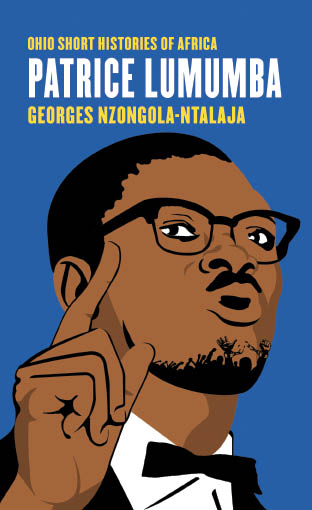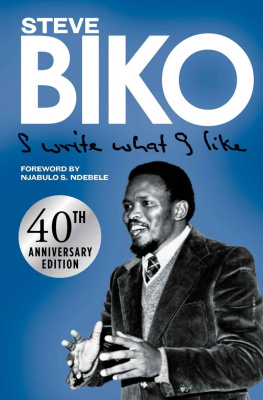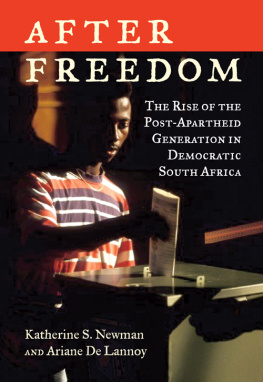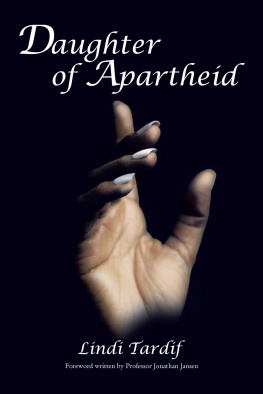
Ohio Short Histories of Africa
This series of Ohio Short Histories of Africa is meant for those who are looking for a brief but lively introduction to a wide range of topics in African history, politics, and biography, written by some of the leading experts in their fields.
Steve Biko
by Lindy Wilson
ISBN: 978-0-8214-2025-6
e-ISBN: 978-0-8214-4441-2
Spear of the Nation (Umkhonto weSizwe): South Africas Liberation Army, 1960s1990s
by Janet Cherry
ISBN: 978-0-8214-2026-3
e-ISBN: 978-0-8214-4443-6
Epidemics: The Story of South Africas Five Most Lethal Hu man Diseases
by Howard Phillips
ISBN: 978-0-8214-2028-7
e-ISBN: 978-0-8214-4442-9
South Africas Struggle for Hu man Rights
by Saul Dubow
ISBN: 978-0-8214-2027-0
e-ISBN: 978-0-8214-4440-5
San Rock Art
by J.D. Lewis-Williams
ISBN: 978-0-8214-2045-4
e-ISBN: 978-0-8214-4458-0
Ingrid Jonker: Poet under Apartheid
by Louise Viljoen
ISBN: 978-0-8214-2048-5
e-ISBN: 978-0-8214-4460-3
The ANC Youth League
by Clive Glaser
ISBN: 978-0-8214-2044-7
e-ISBN: 978-0-8214-4457-3
Govan Mbeki
by Colin Bundy
ISBN: 978-0-8214-2046-1
e-ISBN: 978-0-8214-4459-7
The Idea of the ANC
by Anthony Butler
ISBN: 978-0-8214-2053-9
e-ISBN: 978-0-8214-4463-4
Emperor Haile Selassie
by Bereket Habte Selassie
ISBN: 978-0-8214-2127-7
e-ISBN: 978-0-8214-4508-2
Thomas Sankara: An African Revolutionary
by Ernest Harsch
ISBN: 978-0-8214-2126-0
e-ISBN: 978-0-8214-4507-5
Patrice Lumumba
by Georges Nzongola-Ntalaja
ISBN: 978-0-8214-2125-3
e-ISBN: 978-0-8214-4506-8
Patrice Lumumba
Georges Nzongola-Ntalaja
Ohio University Press
Athens
Ohio University Press, Athens, Ohio 45701
ohioswallow.com
2014 by Ohio University Press
All rights reserved
To obtain permission to quote, reprint, or otherwise reproduce or distribute material from Ohio University Press publications, please contact our rights and permissions department at (740) 593-1154 or (740) 593-4536 (fax).
Printed in the United States of America
Ohio University Press books are printed on acid-free paper
24 23 22 21 20 19 18 17 16 15 14 5 4 3 2 1
Library of Congress Cataloging-in-Publication Data
Nzongola-Ntalaja, Georges, 1944 author.
Patrice Lumumba / Georges Nzongola-Ntalaja.
pages cm. (Ohio short histories of Africa)
Includes bibliographical references and index.
ISBN 978-0-8214-2125-3 (pb : alk. paper) ISBN 978-0-8214-4506- 8 (pdf)
1. Lumumba, Patrice, 19251961. 2. Prime ministersCongo (Democratic Republic)Biography. 3. Congo (Democratic Republic)Politics and government19081960. 4. Congo (Democratic Republic)Politics and government19601997. I. Title. II. Series: Ohio short histories of Africa.
DT658.2.L85N96 2014
967.5103092dc23
2014029924
Cover design by Joey Hi-Fi
Preface and Acknowledgments
Having grown up as a teenager in the second half of the 1950s, I belong to a generation of young people who were politicized by the struggles of Africans living in colonial territories for decolonization, or freedom from colonial rule. In the Belgian Congo, the country known today as the Democratic Republic of the Congo (DRC), Patrice Lumumba was the most eloquent and the best known of the leaders of the national independence movement. As high school students with some knowledge of world history and current affairs, we were greatly impressed by his vision of a united and strong country that, given its enormous wealth in natural resources, was likely to play a major role in Africas unity and development.
Although I never met Lumumba, I was greatly inspired by his wonderful speeches on the radio and his statements in the newspapers. I became so involved in active advocacy for independence that in April 1960, two months before Congos independence on June 30, I was expelled for anticolonial activities from the Methodist-Presbyterian secondary school in which I was enrolled. Unfortunately, the joy we felt on that momentous day was quickly dissipated by the crisis our country fell into for reasons that were beyond our comprehension. That a person who was democratically elected prime minister and enjoyed majority support in Parliament would be driven out of power and then imprisoned, tortured, and assassinated in less than seven months after independence was too traumatic for most of us to cope with.
Thus, to the trauma suffered by the country due to the heinous crimes of Belgian King Leopold II in an effort to maximize his colonial investment with enormous profits from the brutal exploitation of Congolese resources between 1885 and 1908, was now added the trauma of Lumumbas assassination and the tragic political crisis surrounding it. This crisis took place in the context of the cold war as part of the counterrevolution against national liberation in Central and Southern Africa by a coalition of mining companies, white settlers, and right-wing political groups in the West. A very idealistic young man without much political experience, Lumumba was isolated among unprincipled politicians eager mostly to amass power and wealth, and an international community dominated by those who feared his independence and thus found it convenient to frame his militant nationalism as sympathy for communism.
This book is designed to tell the story of Lumumbas life. Who was he? What made him such an illustrious leader not only in the Congo but also all over Africa, the African diasporas of North America and the Caribbean, and the Third World? Given his centrality to the history of the independence struggle in the Congo and his stature as a pan-African leader, Lumumba deserves a volume in the Ohio Short Histories of Africa. His short, tragic, but inspiring life will certainly enrich this series of informative and concise introductions to important topics in African history. I am very grateful, indeed, to Gillian Berchowitz of Ohio University Press for asking me to contribute this volume on Lumumba to the series, and the two anonymous readers of the manuscript for their excellent comments and recommendations for improving the text.
This biography of Lumumba is based on my reading and research on Congolese politics during the last fifty years, the most important product of which has been my 2002 book The Congo from Leopold to Kabila: A Peoples His tory. Recently, I was honored to write a long introduction to a short book of Lumumbas speeches and writings published by the Geneva-based Centre Europe-Tiers Monde (CETIM), Patrice Lumumba: Recueil de textes introduit par Georges Nzongola-Ntalaja (2013). I am grateful to Julie Duchatel and Florian Rochat, the CETIM editors, for having kindly associated me with this wonderful initiative for a wider dissemination of Lumumbas political thought.
It is hoped that readers of this biography will be so fascinated by Lumumbas incredible story that they will want to learn more about him and his times. Unfortunately for English-language readers, the most comprehensive narrative concerning his life, the historical context in which he came of age politically, and his journey from the lower civil service to the office of prime minister is now available only in books published in French. Of these, four sources need to be singled out. The first is the outstanding book by Jean-Marie Mutamba Makombo on the emergence of the volus or African elites and their leadership of the nationalist movement in the Congo, Du Congo belge au Congo indpendent, 19401960 (1998). The second and third sources are the well-researched books on Lumumbas youth, civil service career, and political activ ities until February 1960 by Jean Omasombo and Benot Verhaegen entitled Patrice Lumumba: Jeunesse et apprentissage politique, 19251956 (1998) and Patrice Lumumba, acteur politique: De la prison aux portes du pouvoir, juillet 1956fvrier 1960 (2005). The fourth source is a look at Lumumba from the context of the history of the Sankuru region by Thomas Turner, Ethnogense et nationalisme en Afrique centrale: Aux racines de Patrice Lumumba (2000).
Next page





